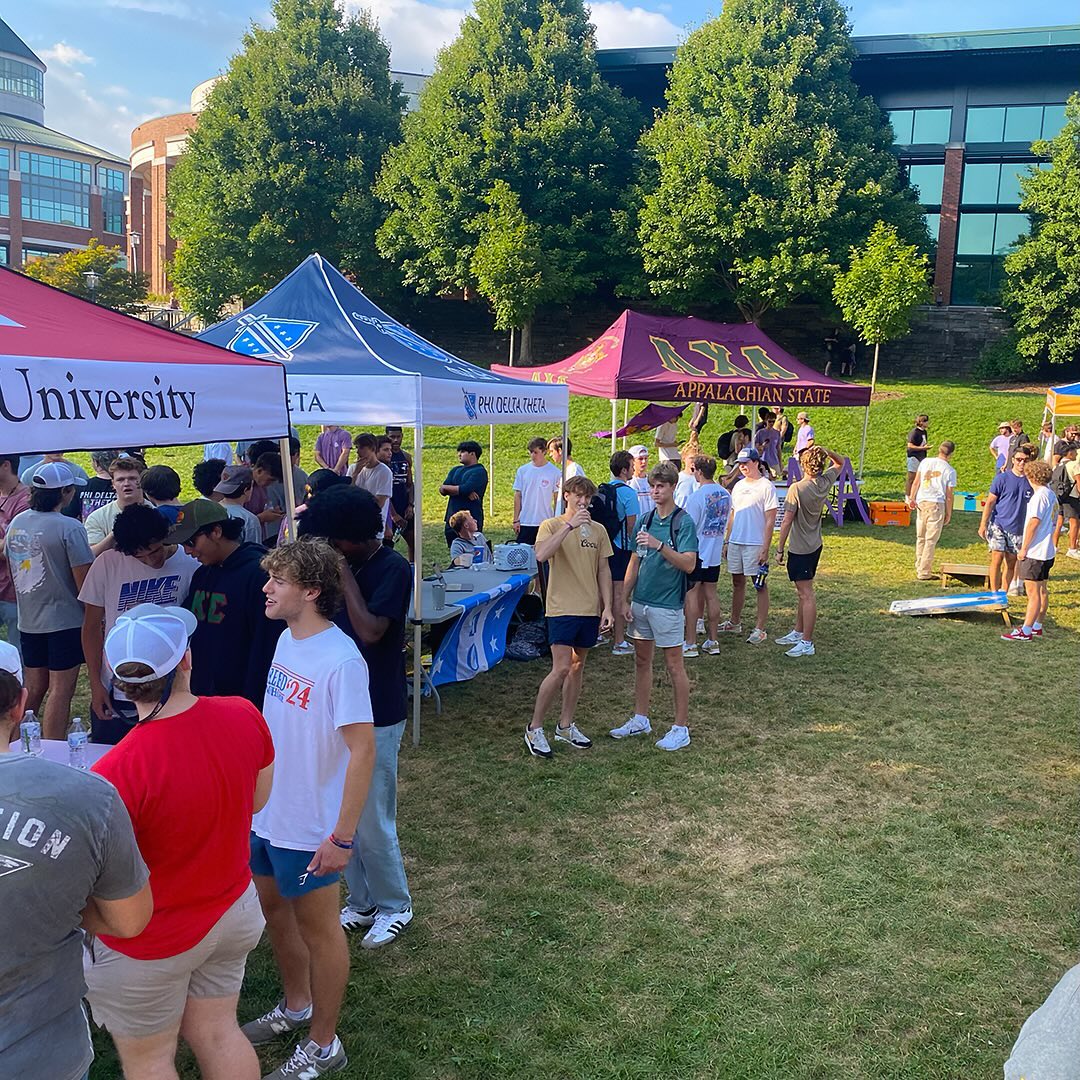About
Fraternity and Sorority Life at Appalachian State University works with 35 recognized fraternities and sororities. We provide programs and services, active oversight of chapter events, maintain communication with faculty, alumni advisors, and parents, organize leadership retreats and workshops, monitor the academic performance of fraternity and sorority members, and recognize the positive achievements of the organizations.
The Fraternity & Sorority Life team oversees recruitment operations and provides ongoing educational programming opportunities to members of the community. Our fraternity & sorority community helps students to feel more connected to the university, establish a sense of belonging, and develop critical skills to undergraduate and career success.

Our Mission
As a part of the Office of Campus Activities, we are committed to facilitating transformational student experiences by creating a vibrant student life community where all students feel valued, connected, and successful.
Fraternity and Sorority Life at Appalachian State University exists to support our organizations in creating a membership experience that is safe, encourages growth and accountability, and supports the development of each student.
Our Values
- Belonging
- Integrity
- Personal Growth
- Engagement
- Accountability
- Compassion
Our Priorities
- Health, Wellness, and Harm Prevention: We believe our fraternity and sorority members should have a fun, enjoyable, and safe membership experience. We provide our chapters with the tools and resources needed to help them create an environment that prioritizes safety, wellness, and responsibility for their members and the community.
- Leadership Education and Development: We provide students the opportunity to learn more about and develop their leadership capabilities through workshops, experiential learning, advising, and other programs.
- Belonging: We support our organizations in creating a community that values acceptance and celebration of all members in the App State Fraternity & Sorority community. We provide programming to support the education of members and better the experiences of all members in the community.
- Personal and Professional Development: We provide programming that helps students gain more self-confidence, prepares them for life after college, and become better citizens of their communities.
- Civic Engagement: We provide our students with opportunities to connect with campus and community partners to help them create positive change on campus and in the Boone community.
Membership
The Fraternity and Sorority Life community at App State is committed to academic excellence and student success. Each chapter upholds minimum GPA requirements for membership and offers academic support such as study halls and peer tutoring. Members are recognized for academic achievement, and the Office of Fraternity and Sorority Life works with executive councils to ensure academic accountability. View semester grade reports here.

Member Expectations
Members are expected to:
- Uphold the principles, values, and standards of their inter/national organization.
- Actively participate in chapter meetings, educational/leadership programs, community service events, and social activities.
- Remain in good standing by paying dues each semester.
Time Commitment
Membership requires a substantial time commitment. The more members engage with their chapter, the more they benefit from the experience. Most organizations also encourage involvement in other clubs or campus activities to support a well-rounded student life. For many students, 1-3 commitments are manageable, with fraternity/sorority membership equating to 1.5-2 of those commitments.
Housing
Appalachian State University does not have Fraternity or Sorority Housing on campus and off-campus fraternity housing (i.e. live-outs, annexes, etc.) are not recognized by the University.
Recognized/Unrecognized Fraternities and Sororities
Fraternities and Sororities recognized by the University are in good standing with the University and are closely monitored, advised, and supported by the Office of Fraternity and Sorority Life and the Office of Campus Activities. These organizations can participate in activities such as Greek Week, Formal Recruitment, FSL Leadership Summit, etc., and have many campus resources available to them including campus facilities.
Unrecognized organizations are no longer associated with the University, and have been removed for failure to uphold standards, social misconduct, and/or hazing. These groups no longer receive support or advisement from the Office of Fraternity and Sorority Life and are unable to utilize campus resources or facilities, participate in FSL programs, or work with the Interfraternity Council, Panhellenic Council, and the National Pan-Hellenic Council. Unrecognized Fraternities and Sororities are not allowed to have social functions with any of the recognized Fraternities and Sororities. Their recruitment and new member activities are not monitored, nor are their social events, and they are not held accountable to the campus Fraternity and Sorority Life policies or regulations. Most organizations that have their recognition removed by the University also have their National recognition removed.